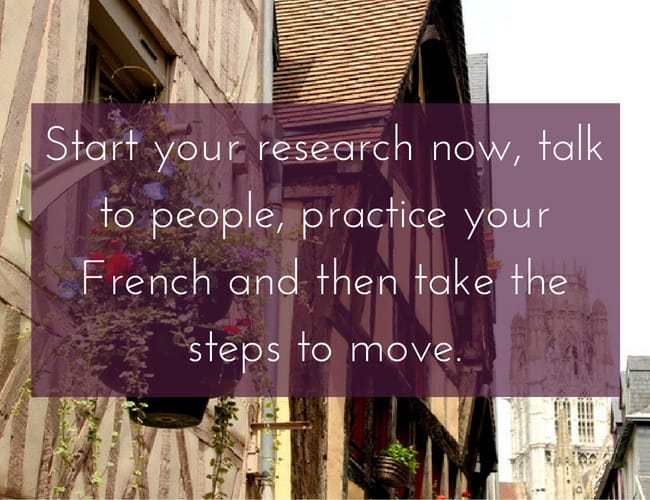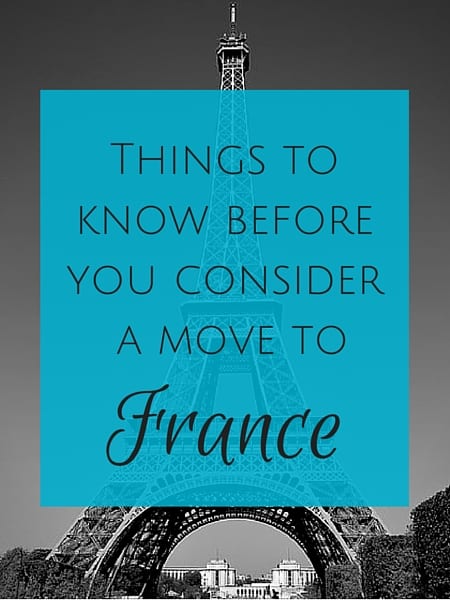Hi guys, the most popular question I get from readers is about how to move to France. People write me looking for advice, reassurance and encouragement, all of which I’m happy to give. Some are single people in their 20s looking to study abroad, others are married with kids and want to try something new, and others are couples of retirement age looking to slow down and soak up French culture.
I’m the first to say I’m not an expert on how to move to France; I’m just someone who has done it. My blog focuses more on what life is like once you’re in France and not how to move to France, but I wanted to compile some resources for anyone out there who may be considering a move.
Here are my suggestions and a few pieces of advice on how to move to France.
Read on!
How to move to France
Let me kick this off by saying moving abroad was one of the best choices of my life. It hasn’t been easy, not by a long shot, but the challenges I’ve faced as a foreigner abroad — and continue to face — have helped strengthen my resolve, taught me the meaning of patience and made me into a more well-rounded, sympathetic person who has more life experience than she did pre-France move.
And the cheap wine, cheese and baguettes have been a nice touch too. 😉
If you’re new here, I moved to France after getting married to a French guy back in 2011. My journey here, logistically speaking, was easy and I’ll never tell you otherwise. But life in France as a foreigner? That’s not always easy.
But what about if you have no French partner, no job lined up and no plan?
Deep breath.
If you want to move to France, you can make it happen no matter what people tell you. Read that again. You can make it happen.
That’s where perseverance and on-point research skills will come in handy.
I also want to say this upfront: If you want to move to France, take the steps to do it.
Start your research, talk to people, practice your French and then take the steps to move. I want to encourage you to go after what you want.
There’s no shortage of naysayers out there who poo-poo others’ dreams. Life is also short.
It’s so easy to sit back and tell others why their ideas are wrong. Or too difficult. Or are never going to work out. Know what I have to say to those people? Mind your own business.
The main ways you can come to France to live beyond 90 days:
(This is not an all-inclusive list. Check up-to-date information about visas and the legal aspects of how to move to France on the General Consulate of France’s website in your region. Whether you need a visa to France or a Chinese visa, etc., my advice below applies)
- Marry a French or EU citizen or get PACSed
- Study in France and get a student visa
- Work visa: Either get hired by a company in your home country who sponsors your visa and sends you to France or get hired by a French company who will sponsor your stay (NOT impossible to do, keep on reading…)
- Get a special visa if you’re a model, artist, scientist or diplomat
- Long-stay visitor’s visa (will have to sign an attestation saying you won’t work, that you have sufficient funds as well as private health insurance)
- Get the Compétences et Talents visa (more on French visa types here). “If you are talented and want to expand your work horizons in France, this three years once renewable card allows you to exercise the activity of your choice in connection with your professional project,” writes the Consulat General of NY’s website. Jeanette of Love and Passport talks about her experience getting this visa here.
- If you’re between the ages of 20-35, teach English in France as a teaching assistant (I wrote about my experience w/the program here)
- Become an au pair
A general resource on how to move to France:
General Consulates of France in the U.S.
This should be your starting point so you understand the types of visas that are out there. It’s so incredibly important to get reliable info so start with the consulate. To legally stay more than 90 days in France, Americans will need some sort of visa.
How to move to France tips
Figure out why you want to move
Is it for a one-year trip where you’ll more or less be on an extended vacation? Will you be a student? Are you moving indefinitely? Maybe the French lifestyle and culture appeal to you. Maybe it’s the language and people. Maybe it’s the experience of living in Europe.
Whatever your reasons are for the move, get clear on them from the outset.
Write things down in a notebook, create a Pinterest board for inspiration, put special photos of past trips in a dedicated photo album or on the fridge. When you’re feeling particularly stressed as you start planning your move, look back on the things you’ve compiled to keep your eye on the prize.
Keep in mind there are also reasons why you may NOT want to move to France. And here are 9 things people MAJORLY overlook when moving to France.
Get ready to research and be persistent
Sometimes being too persistent and focused can be turn offs, but when it comes to moving to France, you’ll want to develop these traits. Same goes for being a good researcher. The more you can learn ahead of time, the better. That way when any unexpected obstacles arise, you won’t be caught by surprise.
In the case of looking for an apartment, it’s especially important to do your research in advance. Sites like Nestpick can help you find temporary accommodations for when you’ve just moved since finding a permanent apartment can take a little bit of time. Remember to be prepared for the unexpected even when you do everything right.
When it comes to finding a job in France, keep in mind that many of us change careers or start something new entirely. If you’re a bit lost and at the throwing-spaghetti-at-the-wall stage to see what sticks, I can’t recommend CareerFitter enough. The simple test will take you through a series of questions and scenarios that will help you figure out your strengths and what might be the perfect job fit for your personality. It’s a 10-minute assessment and you’ll get a career report at the end to help you get some clarity.
Let’s talk more about being persistent.
Story time: When I came to France the first time as an English teaching assistant, my contract was only 7 months. After it ended, I began to look for full-time work that would allow me to stay in France with Tom. People told me that it would be nearly impossible for an American to find a job in France and would say, “Good luck” with a little smirk.
A less determined Diane would have been deterred by this and given up, but that’s not me. I didn’t find any job posts that fit my background so I sent out my resume and cover letter unsolicited to companies that were of interest to me. I had a plan and each day I spent several hours researching companies, customizing my cover letters, and going full speed ahead on trying to stay in France.
I got a few replies back, but nothing happened until I was in the airport waiting to board my plane back home. A company was interested in me and wanted to hire me! Long story short, the salary was terrible and I didn’t end up taking the job, but the moral here is that solid research skills and a drive to get what you want go a long way.
About the ominous French bureaucracy: It seems like you’ll get a different answer about how things are done depending on who you talk to. One employee might tell you something one day and then when you call and speak to someone else, you get conflicting information. It’s best to always be prepared with more than you need, so bring the extra document and photocopy. Then be patient.
To make luggage shipping a breeze, consider using Uni Baggage to send your things abroad.
Things to know before you consider a move to France >>
Start learning French now
You can move to France with limited French knowledge, but I wouldn’t recommend it. With all the stress of a move abroad, you’ll want to minimize any language issues that’ll only add to the stress. I’m not saying you have to be fluent or anywhere close but a solid intermediate level is a good goal.
Start learning French now so your interactions with the French go as smoothly as possible. You’ll need to find a place to live, open a bank account and navigate other aspects of setting up shop somewhere new. Many big cities have English-language services, but in smaller towns that is not always the case. If you can speak French (at least enough to get by), you’re one step ahead.
Take off your rose-colored glasses
You can find loads of blog posts on how great France is with the simple click of a mouse. There’s no shortage of those — and France is great. I wouldn’t still be here otherwise. But…. I’d be doing you a disservice if all I wrote about was how wonderful France is and never told you about some of the obstacles you may want to seriously consider.
I’ve written at length about how France is a place like any other and has real problems just like any country in the world. Living in France is not the same as vacationing in France. I feel like sometimes the stereotypical romanticized notions of France in people’s minds put the entire country up on a pedestal. There are pros and cons to life here.
We are told the French are all amazing and their lifestyle is what we should strive for. We hear about how the French are all great parents who eat farm-fresh food. They are all so polite and kind and model citizens who win at life. But you can find people like that anywhere just like you can find those at the opposite end of the spectrum.
As a foreigner coming to live in a new country, there will be culture shock, language difficulty even if you already speak French, homesickness, bureaucracy, finding an apartment, etc. And let’s not forget regular life problems that seem to be magnified when you’re so far away from what feels comfortable. I’m talking about things like health issues, death of a loved one, relationship trouble, financial problems, etc.
If you’re realistic about how life will be abroad, it will only set you up for a positive experience, so why not start the process with your eyes open. It’s better to take off those rose-colored glasses well in advance of your arrival.
Bonne chance!
***
Feel free to post more resources on how to move to France in the comments section below! Hope you found this helpful. 😉
PIN ME:









For anybody who wants to work, it’s a LOT easier to do it as a transfer from a multinational corporation. For one thing, your company takes care of the paperwork, the visa, the moving. For another thing, you have an immediate support system of colleagues who can suggest doctors, plumbers, hair stylists, etc.
Moving to France is just as hard/easy as getting a U.S. green card to live in the U.S.
Want to move to France? Do it. It’s awesome. But there’s one thing you need to do: speak French. Seriously. The French (well, some of them) speak English, but their accent is so horrible you will not comprehend it and they will not comprehend you. You will not appreciate this country unless you speak French.
Great advice, I can’t imagine moving to a different country hell I can’t imagine moving houses so I think those who pack up and move to a different country are amazing people
Don’t forget that any citizen of another EU member can live/work in France. Know your ancestry and look into the possibility of obtaining an EU Passport. For instance, having a single grandparent born in Ireland is all it takes.
This is a great post! I’m relatively new to France and I’ve already received the same questions. For those with a college education or several years experience, I came here with an EU Blue Card (https://www.apply.eu/) through my employer; however, you can register on the site to be matched with employers looking for your skills.
I second the part about learning French! If I hadn’t quickly made two French friends and didn’t have a really great General Manager, I would have had serious issues already and that’s despite testing at a lower-intermediate level. I wish I’d spent more time studying French during the years when I wanted to move here, but wasn’t sure I’d ever figure out how!
As a professional writer, I find it appalling that you would begin a piece with “Hi guys”. At the least, it is slang, at most it is gender specific, exclusionary and sloppy. Please reconsider your use of such a word and up your standards. After reading that I had no desire to continue the reading of your article.
Hi Lexa, thanks for your comment. My blog’s tone is conversational — not formal writing — and I’m sorry you took offense to “hey guys.” It was not intended to offend. If I was writing a formal piece in a formal publication, I would not have taken the same tone. Anyway, hope you found what you were looking for and if you stick around, I’m sure you’ll find value in my posts about French culture and what life can be like for a foreigner. All the best to you.
Hey, Diane! I have a question:
Which visa should I get if I will be fresh out of high school at eighteen and want to go to France to work and see what’s right for me? Should I look at different shops or restaurants that would hire young adults such as myself? I am studying French in high school and plan on taking a few college-level French classes during my upcoming senior year of high school. I’m also considering the idea of living in France. Which visa do you recommend? I would not be a college student during that time.
I’m not sure that the comments about the same of “Hey, guys” was serious. English is not French, and “guys” used in this fashion is not gender specific. It means “people” or “folks”. But my mother is an English professor, so what do I know? 😉
Thank you! I’m an American currently living in Germany but trying to make my way over to France, and you are right! Everything I read says finding a job and getting a visa is so hard, or nearly impossible, and you should just get a student visa… but I am determined to find a job that will sponsor my visa! It’s so nice to finally read a blog where someone is finally positive about that idea instead of just saying,no, not going to happen. Thanks for the inspiration and I hope all my hard work pays off!
I have the opportunity to live and work in France as an American ex-pat. I have a job and place to live already lined up (managing a bed and breakfast). Those seem to be the two largest obstacles in the moving process – any links or info on what to do in my situation?
Hi Cynthia, I think if you have your job and housing lined up, you’re already ahead of the game. What type of links or info are you looking for?
I’m obsessed with anything French and hoping I can get a trip in sometime before too long!
I’ve been learning French for awhile but am struggling to get fluent in it. Part of the reason I’d love to go on a trip there is to become better at the language, but do you have any tips for learning French?
Hi Megan, check out the language section of my site and YouTube for French language content: https://www.ouiinfrance.com/category/french-language/
Stick with it and hope you can get to France soon!
Hello Diane,
My partner and I are planning to move to France within the next 12-16 months. We are looking at Angers and I would welcome your feedback on areas outside of Angers that should be a consideration? Angers may be out of our price point at this time.
PS: I am a Jersey Girl (currently living in Florida) too!
Hi Mary, I’d recommend that you come and rent a car and then drive around to scout out the Angers area to see what feels right to you. It depends on what you’re looking for really… a lively city, a smaller town, a village or rural area where you can live on a big property and not be bothered. Not sure how old you are, if you’ll be working in Angers, or if you’re staying permanently, but there are a bunch of options to consider. All the areas along the Loire are really beautiful and many are an easy drive (or public transport ride) to Angers. If you’re coming as a visitor for a year, I’d try to find something in Angers just to have that experience and ease of everything being accessible within a short walk, plus the train station if you want to head somewhere else. It’s a wonderful city!
Hi Diane,
I loved this post! I am a British citizen married to a French man and I have moved to France twice in the last 9 years, so I completely related to all your points! I think it’s great to highlight the fact that, while France is an incredible country to live in, there will of course always be bumps in the road!
Case in point – I spent hours online last night applying for something through a government portal. Every document I uploaded came back with an error: ‘Document title should be under 30 characters long’. The joys of French administration!
But for anyone reading, I completely agree. Once you cut through all the tricky bits, it is totally worth it. I would encourage you all to DO IT!